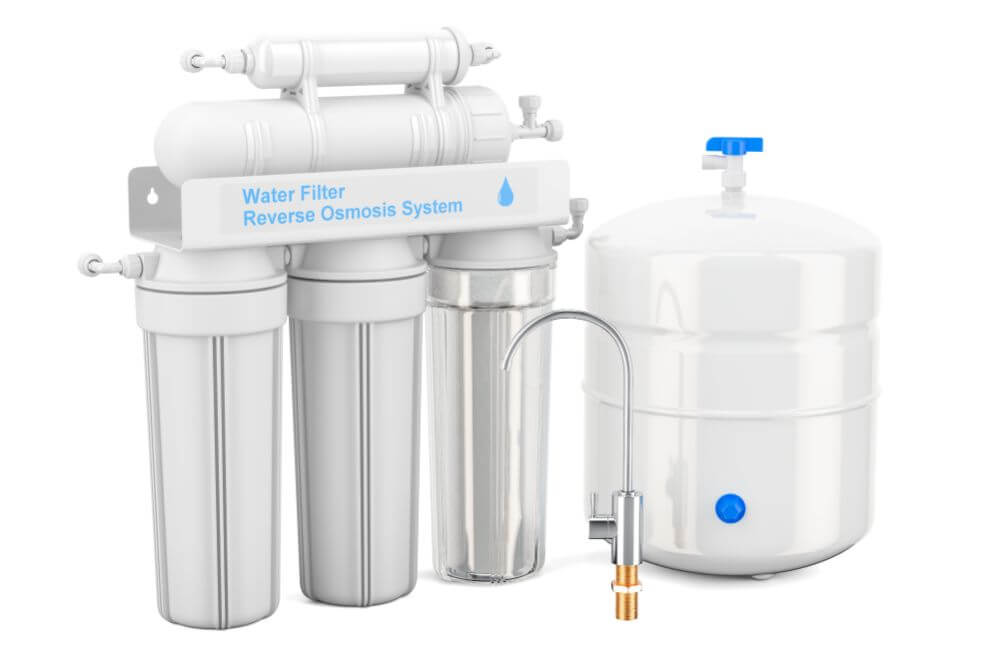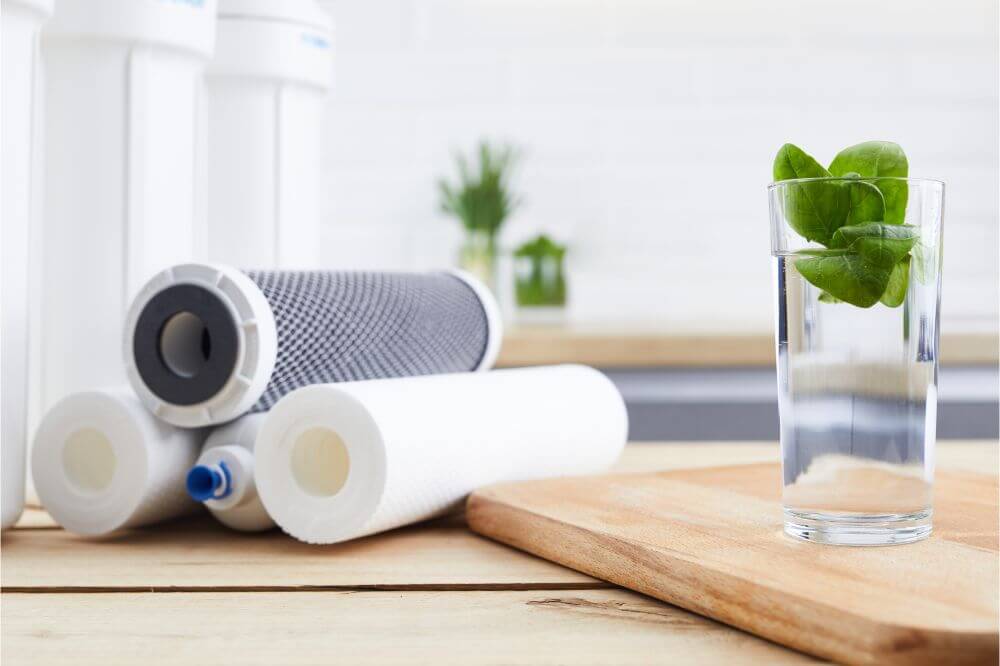If you’re thinking of getting a water filtration system for your home, reverse osmosis is just one of the options. Before we discuss the alternatives to reverse osmosis water systems, let’s discuss what reverse osmosis is, what it removes from water, and its drawbacks. After that, we can talk about the alternatives.
What is Reverse Osmosis?
This filtration method uses a reverse osmosis membrane to filter water. This membrane is made of unique materials. A large amount of pressure created by a pump forces water through that membrane, removing most contaminants and substances from your water.
What Does it Remove?
- Salt
- Bacteria
- Protozoa
- Viruses
- Heavy metals
- Most common chemical contaminants
- Minerals
Drawbacks
- One of the more expensive filtration types
- Demineralized water is not healthy (unless re-mineralized after reverse osmosis)
- Cannot remove chlorine, radon, some pesticides, and various volatile organic compounds.
Alternatives to Reverse Osmosis Water Filtration Systems
There are seven main alternatives to consider to your reverse osmosis filter.
1. Sediment Filters
First is the basic sediment filter. Keep in mind that while reverse osmosis itself does not remove sediment and particles from your water, reverse osmosis filtration systems have prefilters that remove these things.
That said, you should probably have a sediment filter for your home, regardless of whether or not you have a reverse osmosis system under your sink.
These filters feature replaceable cartridges that remove particles that are five microns or larger in size. Sediment filters do not remove various chemicals and contaminants that are smaller than the filter micron size.
2. Activated Carbon Filters
Next are the activated carbon filters, which can come in activated carbon blocks or granular activated carbon.
This type of filter is also ideal for inhibiting bacterial growth. Carbon blocks are affordable; they’re great at filtering contaminants, removing chlorine very well, feature a reasonable flow rate, and help retain essential minerals.
However, carbon blocks do not remove viruses, excess minerals, dissolved solids, or sediment from your water. Granular carbon filtration is much the same, except that it allows for a much better flow rate, although it does an even worse job at sediment filtration.
3. Distillation
One of the most effective water filtration methods is distillation, which is the process of vaporizing water and then condensing it back into liquid form. Many contaminants in the water are then left behind.
Distillation is a powerful form of water purification that can remove the vast majority of contaminants found in water, as well as dissolved solids, excessive minerals, bacteria, and more. Even better is the fact that you never need to replace a filter cartridge.
However, water distillation has many disadvantages, including low output, being very time consuming, requiring a lot of maintenance, consuming a lot of electricity, having a high operating cost; distilled water doesn’t taste very good.
There is also the fact that distillation will not remove organic compounds at the boiling point lower than water.

4. Ion Exchange
Next, come ion exchange water filters. Water is passed through a filter that contains specialized resin. This resin is designed to remove undesirable dissolved ions from the water and replace them with other ions.
Ion exchange is an excellent water filtration method that can remove inorganic contaminants, arsenic, fluoride, nitrates, sulfates, uranium, and other negatively charged compounds. This type of filtration can also remove many minerals from the water.
Drawbacks of ion exchange include the inability to remove sediments, organic compounds, and microorganisms. Moreover, the resin contained in these filtration systems is itself vulnerable to bacterial growth.
5. Ultraviolet Disinfection
Another alternative is ultraviolet or UV disinfection. This water filtration method is excellent for killing nearly 100% of all microorganisms in the water. This is a low-energy and low-cost type of water filtration that is safe and environmentally friendly, not to mention that it barely requires maintenance.
As you might have gathered, this type of filtration uses UV rays to clean your water. However, the drawback is that UV filtration only removes microorganisms and nothing else. That’s just one of the many drawbacks.
6. Activated Alumina Filter
This filter uses adsorptive porous aluminum oxide to remove a variety of chemicals from the water. In fact, these filters remove four specific chemicals, including fluoride, arsenic, selenium, and thallium.
Keep in mind that these filters do not remove anything else from the water besides these four things. Moreover, if it is not used correctly or maintained, it may leach aluminum into water.
7. Alkaline Filter
Technically, this might not be a type of water filter that you would use to filter water in your home for various contaminants. However, alkaline filters are closely related to reverse osmosis filters in a certain sense.
Reverse osmosis systems remove minerals from the water, whereas alkaline filters do the exact opposite – they put minerals back into the water.
Most reverse osmosis filtration systems come with remineralization systems, generally alkaline filters; minerals are added back into the water after the reverse osmosis system removes them, thus providing you with mineral-rich and safe drinking water.
Conclusion
As you can see, there are alternatives to reverse osmosis water filtration systems. We recommend using reverse osmosis to catch all of the leftover contaminants and viruses that your sediment, carbon, and other whole home water filters missed.

